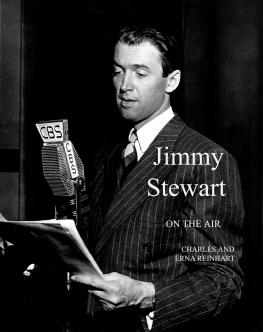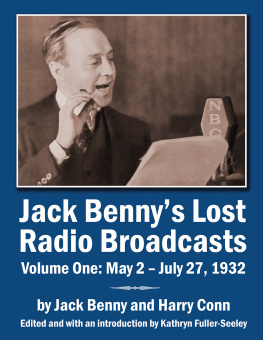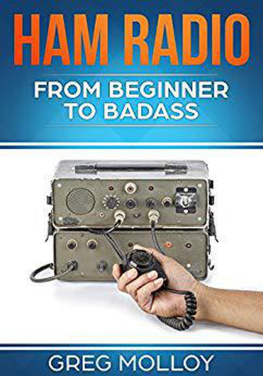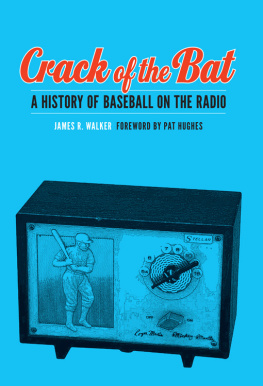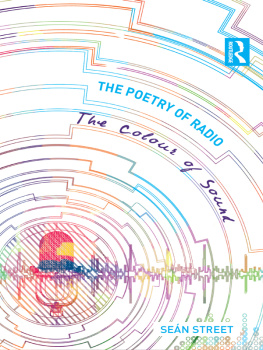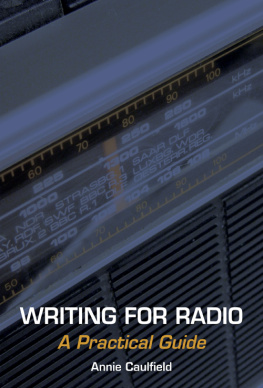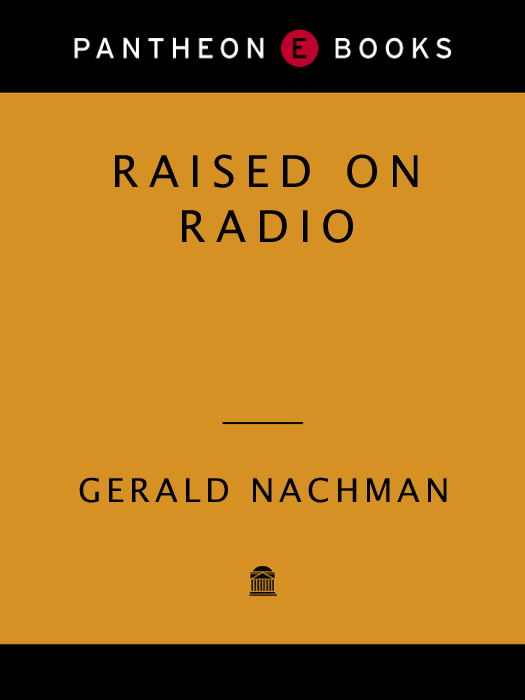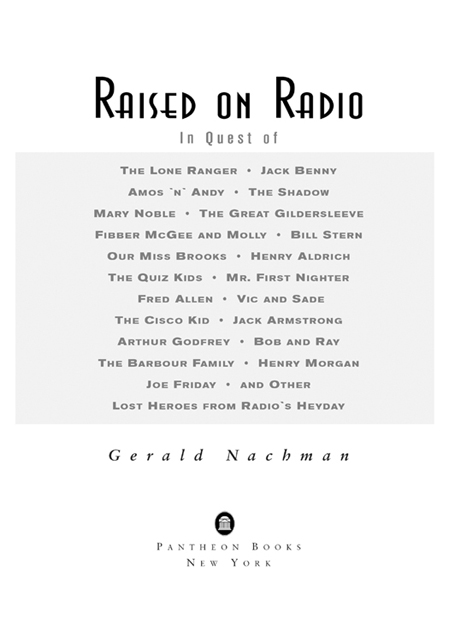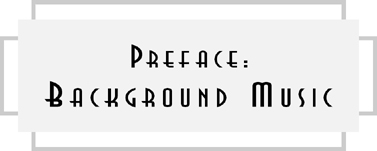ALSO BY GERALD NACHMAN
The Fragile Bachelor
Out on a Whim:
Some Very Close Brushes with Life
Playing House
Copyright 1998 by Gerald Nachman
All rights reserved under International and Pan-American Copyright
Conventions. Published in the United States by Pantheon Books,
a division of Random House, Inc., New York, and simultaneously in
Canada by Random House of Canada Limited, Toronto.
Library of Congress Cataloging-in-Publication Data
Nachman, Gerald.
Raised on radio / Gerald Nachman.
p. cm.
Includes bibliographical references
eISBN: 978-0-307-82894-1
1. Radio broadcastingUnited StatesHistory. I. Title.
PN1991.3.U6N23 1998
791.440973dc21 98-10355
Random House Web Address: http://www.randomhouse.com
v3.1
T O THE MEMORY OF
L EONARD , I SABEL, AND J UDY N ACHMAN ,
THREE OTHER VANISHED VOICES
THAT STILL REVERBERATE
I SUPPOSE I LED A NORMAL ENOUGH BOYHOOD, BUT YOU couldnt prove it by me. Midway through an attempted memoir, I was chagrined to discover that I had pretty much forgotten or misplaced my entire childhood except for the radio programs that absorbed a fairly alarming portion of those early years.
While I have real trouble tuning in to the major events of my boyhood, which seemed to occur between episodes of Superman, Junior Miss, Mr. District Attorney, Stella Dallas, and The Lone Ranger, I have almost total recall of the shows I heard. It is no trick for me, and others raised on radio, to hear an announcers voice or a snatch of a theme song and instantly be able to identify the voice, the show, and the sponsor. The imposing yet ingratiating voices of Ken Carpenter, Harlow Wilcox, Bill Goodwin, Jimmy Wallington, and Ed Herlihy were more familiar to me than those of most of my uncles, aunts, and cousins.
So in a sense this is still a kind of memoir in that many of the shows within these pages were more real to me than my own lifemake of that what you will. I was so busy living the adventures of Baby Snooks, Jack Armstrong, Nick Carter, Jack Benny, One Mans Family, and the Nelson family that my own life seemed worth little more than a passing glance. Stan Freberg once said, While other kids were outside playing baseball, I was inside playing the radio. I played plenty of baseball, but my interior life was largely played out within the little box by my bed. Its where my inner child still resides, but Ive finally let him out to gambol again among the old shows that I wanted to revisit.
It turned out to be a longer tripfour yearsthan I planned on when I first set out. What began as a weekend jaunt, a joyride through my favorite shows, turned into a long journey with unplanned detours into programs that I had all but forgotten about (My Favorite Husband, Sky King, Stop the Music), was too young to appreciate (The Goldbergs, Vic and Sade, Information Please), or for some reason just didnt get or get around to (Flash Gordon, The Judy Canova Show, Chandu).
Also, much wonderful stuff had come and gone before I caught the tail end of broadcastings golden age, from the mid-1940s to the mid-50s, when I was forced to abandon full-time radio listening for college. I missed more shows than I had realized, which made writing this book not just a rediscovery of old beloved shows but a discovery of those I had overlooked or that had vanished by the time I tuned incrucial programs like Norman Corwins poetic docudramas, Rudy Vallees pace-setting Fleischmann Hour, Edward R. Murrows wartime reports, and Fred Allens vintage broadcasts.
In listening to certain old shows again, on tape, it was fascinating to find that programs I had been crazy about, like The Cisco Kid, The Aldrich Family, and The Shadow, were victims of time and didnt bear too many replays. Once youve heard one episode of most swayback westerns and wiseguy detective shows, youve pretty much heard them all. Alas, even the beloved Lone Ranger didnt hold me much beyond its promising overture, as yet another tinny plot would unfold.
Other shows, however, sounded better and richer as I listened to them with more alert adult ears, and could savor the writing, acting, and craftsmanship of superb creations like Suspense, The Great Gildersleeve, Dragnet, The Adventures of Ozzie and Harriet, and, most of all, One Mans Family, a show I had liked even as a boy but realize now why I did, and why this amazing show lasted twenty-seven years.
Certain programs of the periodJack Bennys, Edgar Bergens, Burns and Allens, Lets Pretend, and some of the cleverer spook showshave lost little luster in the intervening half century. Many of the Benny programs might have been written last week; ritualistic as that show was, it never became formulaic, unlike other comedies I was equally addicted to at the timeBlondie, My Friend Irma, and Life with Luigi.
The highlight of a trip to Los Angeles as a kid of eight was dining at Sportsmans Lodge and being introduced to the announcer Ken Carpenter by my Uncle Carlyle, a hip guy with actual Hollywood connections who, like my father, had grown up in Peoria, Illinois, the home of not just Carpenter but also Jim and Marian JordanFibber McGee and Molly. My uncle got us in to see The Gracie Fields Show, and it didnt matter that I had no idea who she waswatching a real radio show unfold as it went on the air was thrill enough. My one other live connection to radio was a scary moment at an early Art Linkletter show called Whats Doin, Ladies?, broadcast from a San Francisco department store, where Linkletter accosted my mother and began pawing through her purse.
I thought I could recall a lot of old radio only to find that what I remembered amounted to only a fraction of the hundreds of series that were on the air. So Ive had to leave out many worthwhile programs, since I didnt want to produce an encyclopedia, and as the title suggests, Ive included mainly those shows that had an impact on me and my generation or that broke new ground and planted the roots of television.
Rather late in the game, I felt a need to meet some of the people who had actually created the shows I was so devoted to. Many were gone, of course, but many of them were (and are) still around and eager to talk about what turned out to be universally golden times for them, too. I missed a few important people by daysPhil Harris took ill and died before we could arrange a time to meet, and the afternoon I called to confirm an interview with Willard Waterman (the second Great Gildersleeve), his wife told me he had died that morning. The writers had the best stories, as writers will, but it was a kick to talk to anyone who had a hand in creating that eravital people like the elderly Cisco Kid, Jackson Beck, charming soap opera mainstays Mason Adams and Betty Winkler Keane, comic actor Arnold Stang, crusty but twinkly writer-producer Irving Brecher, ever-wry gagmen Bob Schiller, George Balzer, Sherwood Schwartz and Bob Weiskopf, the original Jack Armstrong, Charles Flynn, and exQuiz Kid Naomi Cooks, and on and on, all of them generous with their time, memories, and in a few cases, their photos.


